Hypnos: God Of Sleep Who Owns Much Of Our Lives In Greek Mythology
A. Sutherland - AncientPages.com - In "Theogony," a Greek poet Hesiod who likely lived around 700 BC, tells about Hypnos, the god of sleep, and his twin brother, Thanatos, the god of death, who the Greeks occasionally saw as a harbinger of a peaceful death. Their parents were Nyx, the goddess of the night, and Erebus, the god of darkness.
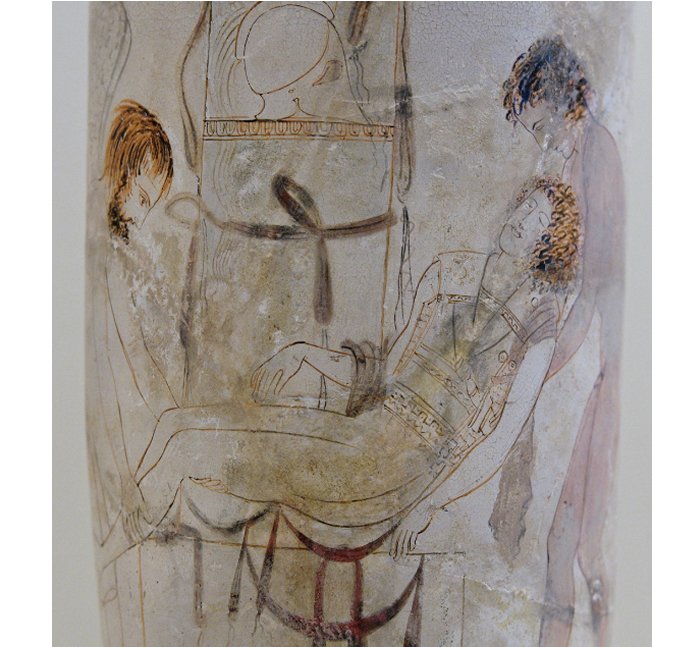 Hypnos and Thanatos carrying the body of Sarpedon from the battlefield of Troy; detail from an Attic white-ground lekythos, ca. 440 BC. source
Hypnos and Thanatos carrying the body of Sarpedon from the battlefield of Troy; detail from an Attic white-ground lekythos, ca. 440 BC. source
The two divine brothers work in good cooperation, and together, they successfully help humans avoid unnecessary suffering and die peacefully during sleep. Hypnos masters people's dreams and owns half of their lives, watching over men's dreams and above all over the gods' dreaming.
Homeric sleep – pleasant but sometimes dangerous
In the "Iliad," Homeric sleep is a good, sweet, and pleasant thing. It brings rest to the exhausted body and brain and helps to forget sorrows.
But sometimes, sleep can also be dangerous when it occurs at the wrong time and place, especially when action is urgently needed. Patroclus, the friend of Achilles, puts on his armor and commands the Myrmidons in a battle against the Trojans. Sadly, he is slain by Hector, one of King Priam's sons. Then, the ghost of Patroclus reproaches Achilles for forgetting his duties towards his dead friend.
In "The Iliad," Homer (c. 800 -c. 701 BC) wrote that to prevent Zeus from joining the Trojan War, Hypnos put Zeus to sleep. Strongly influenced by the goddess Hera's power of persuasion, he did what she wanted. Hera and Thanatos could then bring the body of Sarpedon back to his native Lydia. Sarpedon was a Lycian prince and a hero in the Trojan War, killed before Troy's gates in the battle against the Greeks.
Hypnos successfully outmaneuvered Zeus, and it certainly was a desirable deed, but soon, the father of the gods woke up and knew that he was fooled. He could not even punish Hypnos because "the guilty" already arranged his escape to avoid Zeus' anger and hid in his mother's underworld cave.
Hypnos was usually depicted as a young winged man or boy holding poppy flowers in his hand (or in his hair) and an opium horn.
Among other elements related to Hypnos and his work is an opium horn, which allows him to induce sleep in people.
Hypnos was the God of sleep in Greek mythology. Credit: Adobe Stock - matiasdelcarmine
Tradition has it that he lives in a big cave palace in the underworld. Around his home entrance, grow beautiful poppies and other sleep-inducing plants. Around the cave flows the river Lethe ("Forgetfulness"), one of Hades' underworld's five rivers. Homer's version, the master of people's and gods' dreams, lives on Lemnos, his private dream-island.
He never sets his eyes on the sun, and the night is his kingdom.
The Greeks believed that the consequence of the Hypnos' appearance was the spreading of sleep-weariness, after which came the time of peaceful sleep. Everybody respected Hypnos, and none of the deities (much less human beings) could resist his great power.
Selene, Endymion and Hypnos
An important role plays Hypnos in the tale of Selene and Endymion.
In myth, Endymion is a shepherd who admires the night sky and the moon goddess Selene. Selene falls in love with a handsome boy and often watches over him while he sleeps.
Endymion wanted her love to stay that way forever, but there were problems because Zeus did not want to make Endymion immortal, so Hypnos gave him the power to sleep with his eyes open. From now on, Endymion could constantly watch Selene moving across the night sky.
There was also another reason why Hypnos agreed to give him eternal sleep. The god himself could forever look into Endymion's beautiful eyes and handsome face, and so could Selene.
Legend says that Hypnos travels far and wide across the land and sea with fantastic speed and touches the person's forehead in question with a branch or drops on the eyes, the liquid he carries in his horn of opium.
Three sons of Hypnos
It is believed that he had many sons (the Oneroi), but only three of them are considered as gods of dreams: the first is Morpheus, the assistant of his father Hypnos), delivers dreams to all, but with extreme caution applying the dreams of kings and heroes.
Phobetor appears in dreams "in the form of beast or bird or the long serpent" and delivers terrible dreams, can be a source of phobia), and Phantasos is responsible for surreal dreams or fantasy.
All of them still influence our dreams that can be frightening or pleasant, or good and bad. Humans dream, and so do animals because Hypnos and his sons own much of our lives and are with us forever.
Written by – A. Sutherland - AncientPages.com Senior Staff Writer
Copyright © AncientPages.com All rights reserved. This material may not be published, broadcast, rewritten or redistributed in whole or part without the express written permission of AncientPages.com
Expand for referencesReferences:
STAFFORD, EMMA J. "ASPECTS OF SLEEP IN HELLENISTIC SCULPTURE" Bulletin of the Institute of Classical Studies, no. 38 (1991): 105-20.
Cotterell, Arthur. A Dictionary of World
More From Ancient Pages
-
 Hominins At Nyayanga, Kenya, Manufactured Oldowan Tools Primarily From Diverse Nonlocal Stones
Archaeology | Aug 20, 2025
Hominins At Nyayanga, Kenya, Manufactured Oldowan Tools Primarily From Diverse Nonlocal Stones
Archaeology | Aug 20, 2025 -
 Grave Of Amazon Warrior Who Lived In The Kingdom Of Urartu Discovered In Armenia
Archaeology | Nov 28, 2019
Grave Of Amazon Warrior Who Lived In The Kingdom Of Urartu Discovered In Armenia
Archaeology | Nov 28, 2019 -
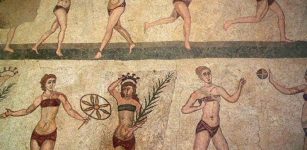 Ancient Roman Women Wore Bikini In 1400 B.C.
Ancient History Facts | Jul 17, 2017
Ancient Roman Women Wore Bikini In 1400 B.C.
Ancient History Facts | Jul 17, 2017 -
 How Climate Change Contruibuted To The Transition From Nomadic Hunter-Gatherers To Settlement And Farming Societies
Archaeology | Nov 27, 2021
How Climate Change Contruibuted To The Transition From Nomadic Hunter-Gatherers To Settlement And Farming Societies
Archaeology | Nov 27, 2021 -
 The Pompeii Of The Fens: Ancient Village In Cambridgeshire Burned Down 3,000 Years Ago For Unknown Reasons
Archaeology | Jul 14, 2016
The Pompeii Of The Fens: Ancient Village In Cambridgeshire Burned Down 3,000 Years Ago For Unknown Reasons
Archaeology | Jul 14, 2016 -
 How Can AI Affect Human Evolution? Predicting Changes In Brain Size And Social Behaviors
Evolution | Nov 22, 2024
How Can AI Affect Human Evolution? Predicting Changes In Brain Size And Social Behaviors
Evolution | Nov 22, 2024 -
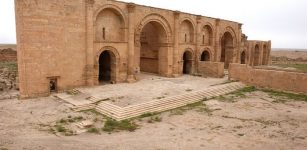 Hatra: Ancient Powerful Caravan City That Could Withstand Invading Roman Armies
Featured Stories | Dec 12, 2020
Hatra: Ancient Powerful Caravan City That Could Withstand Invading Roman Armies
Featured Stories | Dec 12, 2020 -
 New Cosmic Ray Bombardment Of The Great Pyramid – Search For The Hidden Chamber Continues
Archaeology | Jan 20, 2020
New Cosmic Ray Bombardment Of The Great Pyramid – Search For The Hidden Chamber Continues
Archaeology | Jan 20, 2020 -
 Mysterious Ancient Stone Structure Discovered In Torreano, Italy
Archaeology | Mar 29, 2023
Mysterious Ancient Stone Structure Discovered In Torreano, Italy
Archaeology | Mar 29, 2023 -
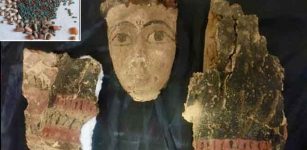 Relics Dated To Byzantine And Late Period Unearthed In Meir Necropolis In Assiut, Upper Egypt
Archaeology | May 15, 2023
Relics Dated To Byzantine And Late Period Unearthed In Meir Necropolis In Assiut, Upper Egypt
Archaeology | May 15, 2023 -
 Echidna – Mother Of All Monsters – A Cave-Dwelling Female Hybrid Creature In Greek Mythology
Featured Stories | Jan 13, 2022
Echidna – Mother Of All Monsters – A Cave-Dwelling Female Hybrid Creature In Greek Mythology
Featured Stories | Jan 13, 2022 -
 God Ptah ‘Lord Of Memphis’ Was Among The Most Revered Creator Gods Of Ancient Egypt
Egyptian Mythology | Apr 17, 2018
God Ptah ‘Lord Of Memphis’ Was Among The Most Revered Creator Gods Of Ancient Egypt
Egyptian Mythology | Apr 17, 2018 -
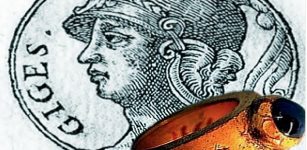 Magical Ring Of Gyges And Its Power To Be Invisible At Will
Featured Stories | Feb 16, 2023
Magical Ring Of Gyges And Its Power To Be Invisible At Will
Featured Stories | Feb 16, 2023 -
 On This Day In History: Edgar Allan Poe Known For Tales Of Mystery And Macabre Was Born – On Jan 19, 1809
News | Jan 19, 2017
On This Day In History: Edgar Allan Poe Known For Tales Of Mystery And Macabre Was Born – On Jan 19, 1809
News | Jan 19, 2017 -
 Ruins Of Sodom, Lost Ancient Biblical City Destroyed By God – Uncovered
Archaeology | May 5, 2015
Ruins Of Sodom, Lost Ancient Biblical City Destroyed By God – Uncovered
Archaeology | May 5, 2015 -
 When Science, Spirituality and Magic Meet – Re-Discovering Old Ancient Knowledge
Featured Stories | Feb 18, 2020
When Science, Spirituality and Magic Meet – Re-Discovering Old Ancient Knowledge
Featured Stories | Feb 18, 2020 -
 Paititi: Legendary Lost Inca City Of Gold Built By The Inca Hero Inkarri
Featured Stories | Mar 16, 2016
Paititi: Legendary Lost Inca City Of Gold Built By The Inca Hero Inkarri
Featured Stories | Mar 16, 2016 -
 World’s Oldest Dala Horse Discovered In Sweden
Archaeology | Jul 18, 2020
World’s Oldest Dala Horse Discovered In Sweden
Archaeology | Jul 18, 2020 -
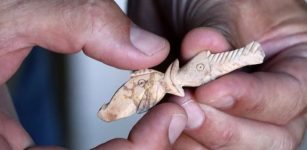 2500-Year-Old Objects Made From Goat Bones Discovered In Turkey’s City Of Aigai
Archaeology | Sep 17, 2020
2500-Year-Old Objects Made From Goat Bones Discovered In Turkey’s City Of Aigai
Archaeology | Sep 17, 2020 -
 Incredible Prehistoric Discoveries Made By A Local Community That Helped Researchers
Featured Stories | Mar 23, 2023
Incredible Prehistoric Discoveries Made By A Local Community That Helped Researchers
Featured Stories | Mar 23, 2023

